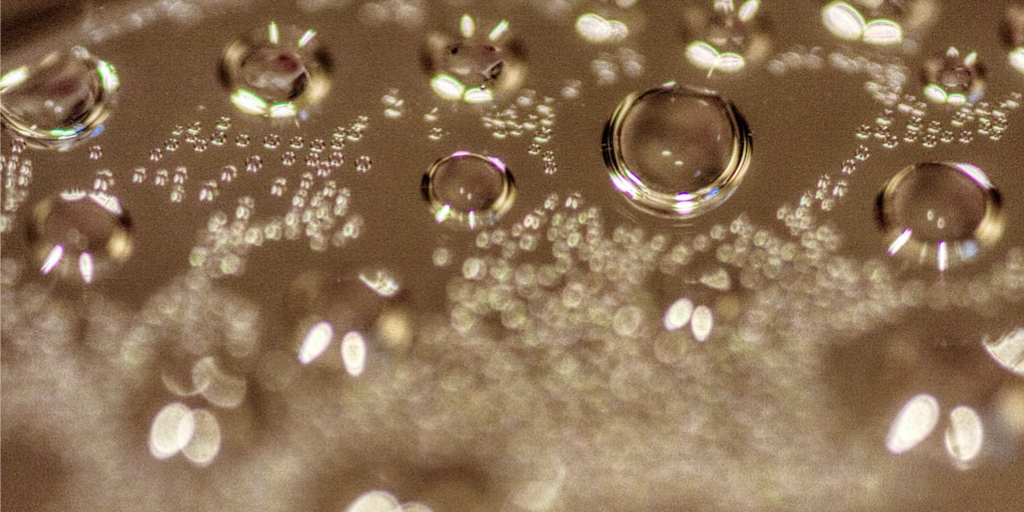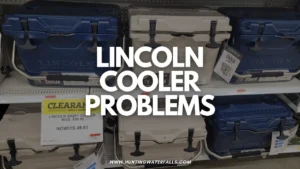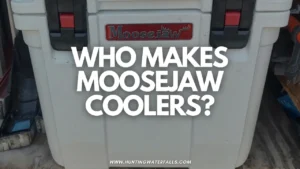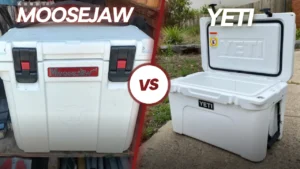Coolers are great at keeping things cold and keeping ice for a long time, but the same insulating ability can be used to keep things hot, including water.
But can you put hot water in a cooler? And how about putting boiling water in a cooler? And how hot can the water be before it actually damages the cooler or melts the plastic?
You can put hot water under 82°C (180°F) in coolers but boiling water will likely warp the inside of a cheaper. However you CANNOT put boiling water in an expensive roto-molded cooler like Yeti. This can ruin the insulating foam and permanently damage the cooler.
It's also good to know that pretty much all coolers are made out of non-toxic and generally food-safe plastics. Coolers are BPA free so you don't have to worry about the leeching of that nasty chemical into your water.
Cheaper coolers are made from polypropylene plastic while more expensive coolers like Yeti are made from high-density polyethylene (HDPE).
Polypropylene and polyethylene are widely considered one of the safest plastics for food and drinks and sites like ToxicFreeFuture list them as they type of plastics to look for in food containers.
Hot and Boiling Water In Cheaper Coolers
I recently came across some articles talking about how to cook corn in a cooler (they call in “cooler corn”) and my Mr Safety ears were pricked because I was unsure if you could put boiling water in a cooler.
Would it melt or warp the plastic? Would the insulation be able to handle it? Would it leech toxic chemicals into the water and thus into the corn?
First we will look at cheaper coolers. These are coolers like the Coleman Xtreme or other well known brands like Igloo and Rubbermaid. Basically any cheap cooler you can pick up from the local hardware store for under $50.
We'll talk about expensive roto-molded coolers like Yeti in a bit, as these are made from very different materials and perform differently.
Can Cheaper Coolers Handle The Heat?
The inside plastic of cheaper coolers is usually made from polypropylene which has a melting point of 130°C (266°F). So even boiling water is not going to melt the plastic.
They usually use styrofoam insulation or extruded polystyrene and the melting point of this material is around 210°C (410°F) according to this site. It can enter a glass transition point around 100°C (212°F) where it can start to flow.
However, pouring boiling water into a cooler it's unlikely to stay above the boiling point as you pour it in. Exposure to air and lack of an external heating source means it will quickly drop below 100°C (212°F). So your polystyrene should be safe.
Potential For Warping
The heat from the hot or boiling water will likely cause the plastic on the inside of your cooler to experience some thermal expansion.
This may lead to some warping of it inside of your cooler.
I found a forum where people who make home brewed beer talked about putting hot water in their coolers. It seems this group of people has a lot of experience with this and they suggested that under 82°C (180°F)
Here's what one of them had to say:
I usually put some hot water (180F) in to preheat my tun, but any hotter and you get a little warping and melting.
When using hot water in a cheaper cooler it is recommended to keep the temperature under 82°C (180°F) to reduce the chance of the plastic warping.
Will The Plastic Leech Toxic Chemicals When Exposed To Hot Water?
The inside of cheaper coolers is made from polypropylene which is BPA free and is widely considered one of the safest plastics to use with food or drinks.
According to this website polypropylene is fine to be used with warm or hot water:
Because of its high heat tolerance, Polypropylene is unlikely to leach even when exposed to warm or hot water. This plastic is approved for use with food and beverage storage. Polypropylene plastics can be re-used safely and with hot beverages.
Hot/Boiling Water In Expensive Coolers Like Yeti
When it comes to putting hot or boiling water in an expensive roto-molded cooler like Yeti, RTIC, Orca, Pelican, Ozark Trail or any other brand the story is completely different.
You should NOT put hot or boiling water in a roto-molded cooler like Yeti. The plastic may experience warping but more importantly the insulation inside may begin to liquify completely damaging your expensive cooler.
Can Yeti Coolers Handle The Heat?
The inside and outside plastic of Yeti and other roto-molded coolers are usually made from high-density polyethylene (HDPE) which has a melting point of around 120°C (248°F).
While boiling water should not melt the plastic it would likely cause thermal expansion of the plastic and permanent warping.
However, the real issue is with the insulation. Expensive roto-molded coolers use polyurethane insulation.
Polyurethane is a thermosetting polymer and according to this site is generally not rated to handle temperatures around the boiling point of water:
In general, polyurethane can be used in the temperature range of -62°C to 93°C (-80°F to 200°F). Special formulations can extend polyurethane’s performance reach to as high as 150°C (300°F).
I personally own a Yeti and would feel very comfortable putting warm/hot water in it for cleaning or keeping things warm. But I would only go up to a maximum of around 49°C (120°F).
It could potentially handle more heat than this but I don't want to ruin a cooler worth hundreds of dollars in order to keep water hot just one time.
Potential For Warping
Hot or boiling water inside a Yeti or similar cooler will cause the plastic to soften and will also cause the plastic to expand.
This can lead to temporary or permanent warping of the inside of your cooler.
Will The Plastic Leech Toxic Chemicals When Exposed To Hot Water?
Roto-molded coolers like Yeti are made from polyethylene plastic which, like the polypropylene in cheaper coolers, is considered to be one of the safest plastics for use with food items.
Yeti coolers states in their owner's manual that:
“YETI coolers are made of food grade UV-resistant polyethylene”
Polyethylene is used widely in food and drink packaging. However, this does not mean no leeching will occur.
Doing my research I found this great page from the Pacific Northwest Pollution Prevention Resource Center (PPRC).
They provide a summary of HDPE and chemical leeching which you might find interesting.
PPRC found no evidence of any widespread health problems related to the use of HDPE in food and beverage or potable water applications.
Independent studies have shown that organic contaminants leach from HDPE pipe into water. While contaminant levels are likely “safe” by USEPA drinking water standards, there are some who will doubt the safety of any level of contamination.
So Yeti and other roto-molded coolers may leech some chemicals when exposed to high temperatures but it is highly unlikely to be enough to cause any health problems, especially if done infrequently.
What Yeti Say About Boiling Water In Their Cooelrs
I reached out. toYeti to hear what their customer support team had to say about hot or boiling water in their Yeti coolers.
Their response was as follows (emphasis added):
Hi Ryan,
Thanks for reaching out to YETI!
To answer your questions:
Yes, Yeti products are BPA free.
Yes, Yeti products are food safe.
I would not advise putting boiling water in any of our coolers as the material is made from a form of plastic and could damage the product.
Hope this helps!
The YETI Outfitters
Jereme S
512.394.9384
[email protected]
Conclusion
In conclusion, from the research I did:
- All types of coolers should be able to handle warm water from a household tap around 49°C (120°F) without any issues of warping or damage to the cooler.
- Hot water under 82°C (180°F) seems to be fine in cheaper coolers, but does carry a slight risk of warping the interior of the cooler. It is less recommended in expensive coolers like Yeti where heat tolerances are lower.
- A cheap cooler will likely warp when exposed to boiling water
- Boiling water has the potential to completely ruin a roto-molded cooler.
I hope this helps answer your question as to whether or not you can put warm, hot or boiling water in your cooler.
Stay cool!




